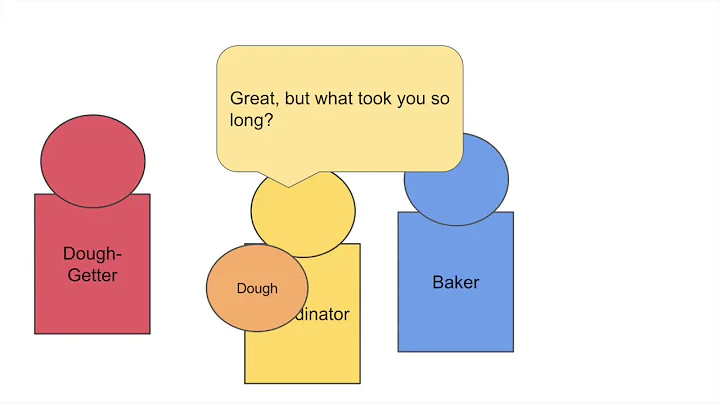How to pass and run a callback method in Python
Solution 1
The thread can't call the manager unless it has a reference to the manager. The easiest way for that to happen is for the manager to give it to the thread at instantiation.
class Manager(object):
def new_thread(self):
return MyThread(parent=self)
def on_thread_finished(self, thread, data):
print thread, data
class MyThread(Thread):
def __init__(self, parent=None):
self.parent = parent
super(MyThread, self).__init__()
def run(self):
# ...
self.parent and self.parent.on_thread_finished(self, 42)
mgr = Manager()
thread = mgr.new_thread()
thread.start()
If you want to be able to assign an arbitrary function or method as a callback, rather than storing a reference to the manager object, this becomes a bit problematic because of method wrappers and such. It's hard to design the callback so it gets a reference to both the manager and the thread, which is what you will want. I worked on that for a while and did not come up with anything I'd consider useful or elegant.
Solution 2
Anything wrong with doing it this way?
from threading import Thread
class Manager():
def Test(self):
MyThread(self.on_thread_finished).start()
def on_thread_finished(self, data):
print "on_thread_finished:", data
class MyThread(Thread):
def __init__(self, callback):
Thread.__init__(self)
self.callback = callback
def run(self):
data = "hello"
self.callback(data)
m = Manager()
m.Test() # prints "on_thread_finished: hello"
Solution 3
If you want the main thread to wait for children threads to finish execution, you are probably better off using some kind of synchronization mechanism. If simply being notified when one or more threads has finished executing, a Condition is enough:
import threading
class MyThread(threading.Thread):
def __init__(self, condition):
threading.Thread.__init__(self)
self.condition = condition
def run(self):
print "%s done" % threading.current_thread()
with self.condition:
self.condition.notify()
condition = threading.Condition()
condition.acquire()
thread = MyThread(condition)
thread.start()
condition.wait()
However, using a Queue is probably better, as it makes handling multiple worker threads a bit easier.
Related videos on Youtube
Comments
-
nbarraille about 4 years
I have a Manager (main thread), that creates other Threads to handle various operations. I would like my Manager to be notified when a Thread it created ends (when run() method execution is finished).
I know I could do it by checking the status of all my threads with the Thread.isActive() method, but polling sucks, so I wanted to have notifications.
I was thinking of giving a callback method to the Threads, and call this function at the end of the run() method:
class Manager(): ... MyThread(self.on_thread_finished).start() # How do I pass the callback def on_thread_finished(self, data): pass ... class MyThread(Thread): ... def run(self): .... self.callback(data) # How do I call the callback? ...Thanks!
-
ThorSummoner over 9 yearsI am interested in a non-threaded callback method example.
-
-
Bharathwaaj over 11 yearsYou cannot pass the local method on_thread_finished to the thread as callback because the local method takes two arguments. When the callback is called from the thread, it will give only one argument (data)
-
 Shariq over 9 yearsI know this is late, but for anyone else who is about to spend an hour rewriting a large chunk of code: Bharathwaaj's comment is completely incorrect and this answer works perfectly.
Shariq over 9 yearsI know this is late, but for anyone else who is about to spend an hour rewriting a large chunk of code: Bharathwaaj's comment is completely incorrect and this answer works perfectly. -
 Be Brave Be Like Ukraine over 8 years@Shariq, the problem is that
Be Brave Be Like Ukraine over 8 years@Shariq, the problem is thaton_thread_finishedstill runs in the child thread, not in theManager. You can't makeManagerdo it becauseManageris doing something else at this time. To see the problem, just makeTest()hang in a dead loop after callingMyThread(). Alternatively, define a local variable and try using it withinon_thread_finished(), e.g.number_of_threads_running -=1 -
Jason about 8 yearsThis won't work if the manager is in a tkinter GUI, you can't call the GUI's functions from a work thread
-
iliis about 8 yearsShouldn't the last line be
thread.start()? Otherwise, no actual multithreading will occur andMyThread.run()gets executed like any other function. But if you actually runMyThread.start()and create a new thread,self.parent.on_thread_finished(self, 42)will still be executed in the new thread's context instead of the main thread. You will need some kind of synchronization, like a Queue, so @jonathan-lillesæter is actually correct. -
Josh Noe over 6 yearsNew to Python. Isn't this a misuse of inheritance?
MyThreaddoesn't seem like a logical child ofManager. -
 Sindarus almost 6 yearsI think it's worth noting that using this solution will execute the callback function inside the secondary thread, not the main thread. Also, what is the use of evaluating
Sindarus almost 6 yearsI think it's worth noting that using this solution will execute the callback function inside the secondary thread, not the main thread. Also, what is the use of evaluatingself.parentin functionrun? Is this to preventself.parent.on_thread_finishedfrom being called ifparentisNone? Why would you do that instead of using anifstatement ? This is confusing...







![PYTHON TUTORIAL: CALLBACKS IN PYTHON EXPLAINED[WITH EXAMPLE]||FUNCTION BASED CALLBACK](https://i.ytimg.com/vi/b7RZbgP6evw/hq720.jpg?sqp=-oaymwEcCNAFEJQDSFXyq4qpAw4IARUAAIhCGAFwAcABBg==&rs=AOn4CLAsJrobf4tby9n4jXL35vuvI0U1KQ)